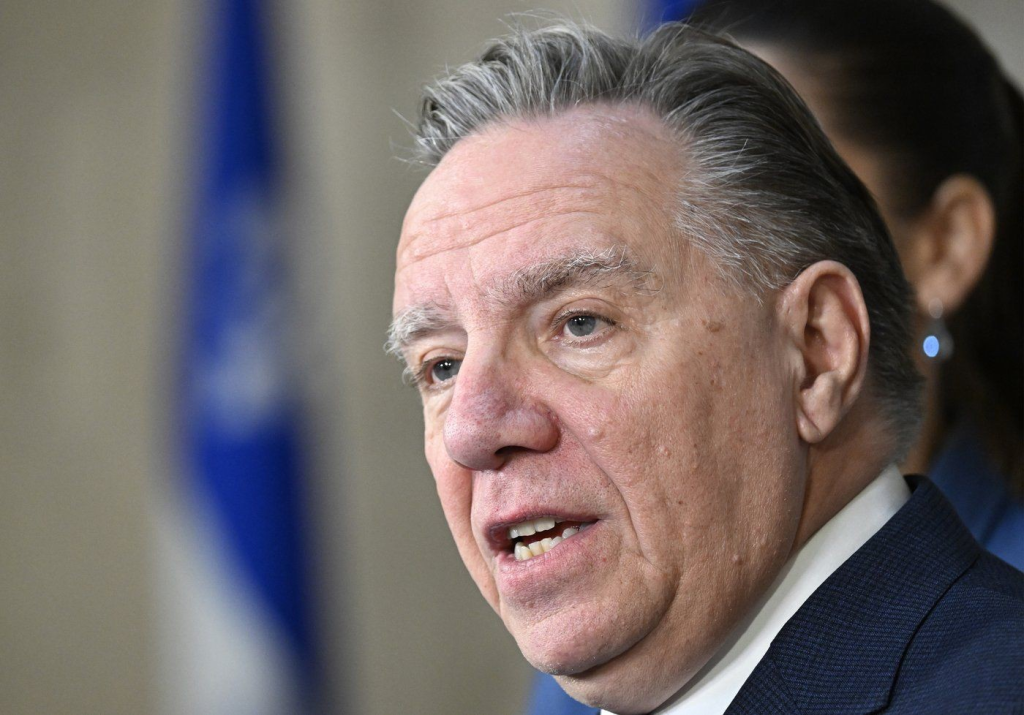François Legault to travel to Washington in February for Council of the Federation mission

Posted January 8, 2025 10:25 pm.
Last Updated January 9, 2025 12:42 pm.
Premier François Legault will be heading to Washington, less than a month after President-elect Donald Trump takes office, threatening to impose tariffs on Canadian exports to the United States.
Legault said he will be traveling to the American capital on Feb. 12 as part of a Council of the Federation mission. He made the announcement following a virtual meeting held Wednesday afternoon with the premiers of the other provinces, one of the topics on the agenda being the 25 per cent tariffs proposed by Trump.
“Quebec and the other Canadian provinces intend to exercise leadership in discussions with the United States. Quebec wants to be present at the negotiating table and will appoint its representative in due course,” he said on the social network X on Wednesday evening.
Lors de ma rencontre virtuelle aujourd’hui avec les premiers ministres des autres provinces, j’ai exprimé ma préoccupation concernant la situation politique actuelle à Ottawa.
— François Legault (@francoislegault) January 9, 2025
J'ai réitéré l’importance d’avoir un plan plus détaillé pour les frontières et des mesures pour…
Earlier in the day, Legault called for “keeping a cool head” as Trump multiplies his threats against Canada.
“Mr. Trump will use every opportunity at his disposal to increase his leverage,” wrote the Premier of Quebec in a letter published on Facebook Wednesday afternoon. “All the more reason to keep a cool head and refuse to play the president-elect’s game.”
This letter is being released at a time when the Republican elected official is multiplying his threats against Canada, but also against other countries. Trump says he will impose 25 per cent tariffs on Canadian exports to the United States. He even went so far as to mention annexing Canada under threat of economic retaliation.
He also brandished the threat of annexing Greenland, which belongs to Denmark, and taking control of the Panama Canal.
Legault believes that Justin Trudeau’s resignation as leader of the Liberal Party of Canada (LPC) has brought its share of uncertainties to Ottawa. He assures that Quebec’s hands are not tied.
“It is certain that we would like to have less uncertainty in the federal government at the moment,” he wrote in his seafaring letter. “But Quebec and the rest of Canada are not without means of action.”
Legault repeated that he shared Trump’s concerns about immigration, as he had already done last November. “I reiterate that it is far too easy to enter Canada under false pretenses,” the letter reads. “Acting to counter this would help reassure the American government.”
“On Nov. 19, I instructed the Ministry of Public Security to begin active surveillance of our territory. Since then, the SQ has been patrolling the border with the United States. We are also in contact with the RCMP, Immigration Canada and with the American authorities. We expect the federal government to significantly tighten the granting of visas and take all necessary measures on its side,” he added.
On Wednesday evening, the Quebec premier mentioned that, during the meeting with his provincial counterparts, he “expressed (his) concern about the current political situation in Ottawa,” and that he “reiterated the importance of having a more detailed plan for the borders and measures to prevent people from entering Canada under false pretenses.”
Legault also urges the federal government to increase its military spending. NATO has set a goal for all its member countries to spend 2 per cent of their GDP on defence.
“Canada is lagging behind on this point, but the federal government is committed to achieving this goal. Ottawa will have to demonstrate that it is serious about this issue and step up the pace. Quebec will also benefit from this since we have several very successful companies in the defence sector,” he wrote in his Wednesday afternoon publication.
If Trump were to impose a 25 per cent tariff on Canadian goods, American consumers and companies would also suffer, Legault believes. He gave the aluminum industry as an example.
“Imposing 25 per cent tariffs would hurt us, but it would also hurt American companies that need our products, not to mention the price increase for Americans themselves.”
–This report by La Presse Canadienne was translated by CityNews








